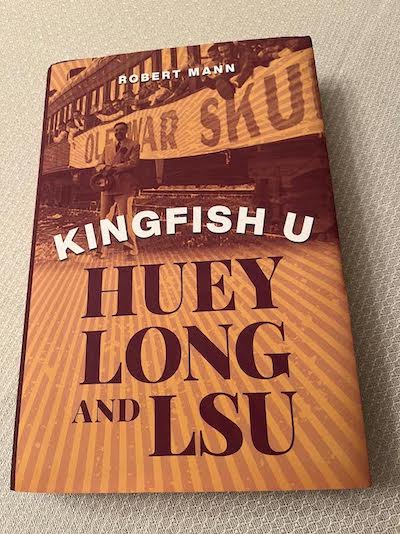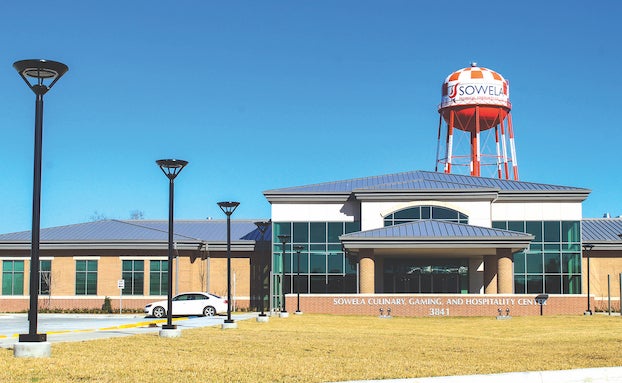Jim Beam column: ‘Kingfish U’ links Long to LSU
Published 7:01 am Saturday, June 3, 2023

- Robert Mann's new book gives readers a close look at Gov. Huey Long's close ties to the state's premier university.
Much has been written about Louisiana’s legendary Gov. Huey P. Long and some of it has touched on his involvement with Louisiana State University. Now, a new book by Robert Mann takes the late-Kingfish’s ties to LSU to a new detailed, informative, and entertaining level.
“Kingfish U: Huey Long and LSU,” published by LSU Press, is an appropriate title for Mann’s comprehensive recounting of Long’s both commendable and controversial connections to the university. Mann said Long’s death at 42 “helped secure his mostly positive legacy at LSU.”
Mann lays out his plans in the preface so that readers will know what they can expect. He doesn’t tell Long’s complete life story or go into detail about his assassination. He also cautions readers to remember that the story of LSU in the 1920s and 1930s “is also a story of racism and white supremacy.”
Although Long died before he was born, Mann has had close ties to Long’s son, the late-U.S. Sen. Russell Long. He was the senator’s press secretary in the 1980s, and he wrote a book about Long.
Mann’s extremely well-documented book is a testament to his political and educational experiences. He holds the Manship Chair in Journalism at the Manship School of Mass Communications at LSU.
It only took me a couple of pages to meet Fred Frey, 39, a courageous man and dean of men at LSU in 1930. Frey met Long when he was looking for someone to speak with at the university.
“What’s your trouble?” Frey asked Long when he said he was looking for the band director.
“I’m going to fire the S.O.B.,” Long said, adding he was going to make LSU a great university.
“No,” Frey said, “you are getting ready to ruin it. You can’t fire anybody and get away with it. You might be a good politician, but you don’t know how to run a university. If you don’t think I’m right, just take a look at Mississippi.”
It isn’t likely that anyone else had ever demonstrated that kind of courage when speaking with Long before or after that particular encounter.
Mann said when Long turned his full attention to LSU after his election as governor in 1928, “life at LSU would never be the same.” When someone questioned Long’s plan for a new LSU president, the governor in 1929 said, “I get control of any board I want and do as I please.”
When Long started traveling with the football team and saw himself as an extension of the coaching staff, Mann said, “This was new, and a sign that Long saw the opportunity for reflected glory from LSU’s success on the gridiron.”
Long was elected to the U.S. Senate in 1930. Mann said as governor and U.S. senator-elect, “Long now ruled Louisiana supreme.” Long was involved in naming a new president and hiring a new football coach and band director.
In 1931, Long began referring to himself as “the Kingfish.” It was a humorous nickname taken from the “Amos ‘n’ Andy” show.
LSU was experiencing unprecedented growth by the 1932-33 school year, thanks to free tuition, low fees, and the ease of paying for their expenses with cotton, produce, or cattle. One coed rode into campus on horseback driving nine cows she turned in to cover her fees.
One of the best known stories about Long and LSU was one that said Ringling Brothers, Barnum & Bailey Circus was to perform the same day as an LSU football game. Long didn’t like that and reportedly told them the circus animals would have to be dipped if the circus insisted on coming on that date.
Mann said looking at the circus schedules in 1933 and 1934, it is difficult, if not impossible, for the story to be true.
LSU was growing in stature and reputation, Mann said, and it was attracting some outstanding writers and scholars to LSU.
Another well-known LSU story is discussed in a chapter titled “The Reveille Seven.” LSU officials punished staffers of the Reveille, the school newspaper, over something critical of Long and the censorship made national headlines.
Mann said Long’s influence on higher education, particularly at LSU, was considerable and long-lasting. In the decade of the 1930s, enrollment at universities nationwide grew an average of 28%. LSU’s enrollment swelled by 333%.
Long put LSU in danger of losing accreditation, but Mann said it is indisputable that LSU’s rapid growth and transformation in the 1930s were primarily results of Long’s efforts.
Mann has given LSU alumni, university fans and many others new and valuable information about Huey Long’s LSU.





